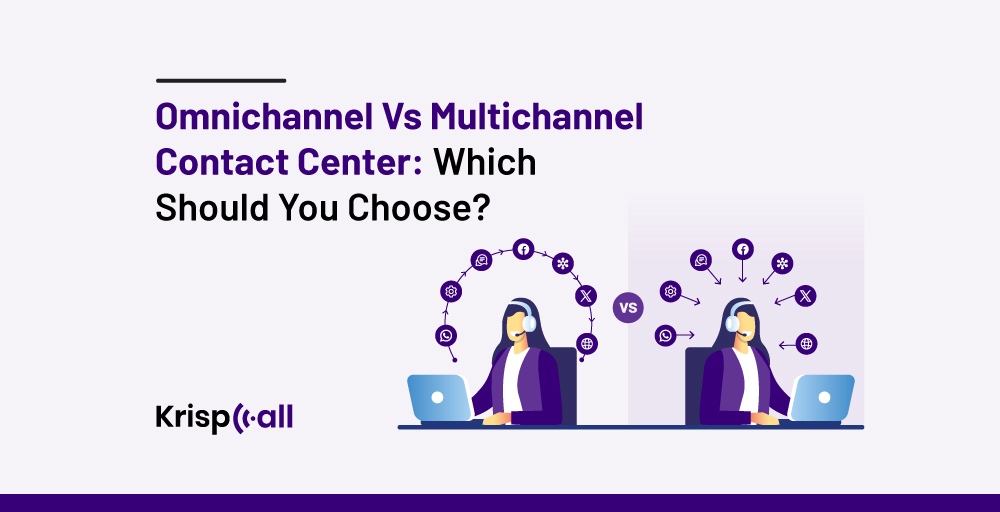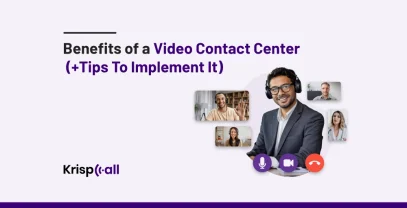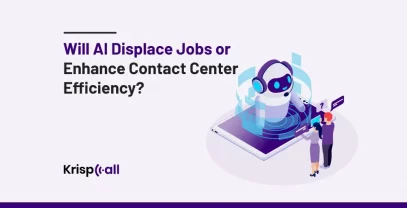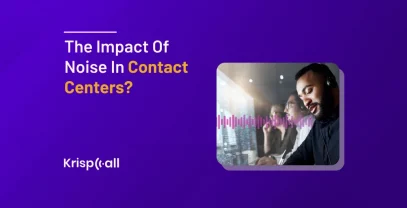Are you in two minds on which contact center to use for your business? And want to know their differences to make sure you choose the right contact center. Then you are at the right place. 😀
Before choosing, evaluate your needs, like whether you want to use a singular agent for different communication channels or want to use different agents for each communication channel. This simply means evaluating ⚖️ your needs will ease your decision-making.
In this blog, we will discuss omnichannel vs multichannel contact center, their benefits, limitations, uses, and differences to understand which one is better for you.
🔑 KEY HIGHLIGHTS
- An omnichannel contact center is a customer service system that lets customers communicate across various channels in one place.
- A multichannel contact center is a customer service system that helps an organization communicate with customers through various communication channels by creating a new separate task each time a customer interacts.
- The benefits of the omnichannel system are enhanced customer experience, quicker responses and resolutions, business insights, etc.
- Channel-specific expertise, ease of monitoring, and simplicity of operation are some benefits of a multichannel system.
- Some areas where the omnichannel system is used are companies with repeat customers, outbound sales and marketing, customer service, and many more.
- Multichannel systems are used by contact centers with fewer agents, companies just starting a contact center, and organizations with a small budget
Omnichannel Vs Multichannel Contact Center: Key Differences
When you evaluate omnichannel vs multichannel contact centers, you will find both are used in customer service; however, they have differences in terms of factors like communication channels, cost, customer experience, integration, and many more.
The following table will show you their differences based on these factors:
| Omnichannel Contact Center | Multichannel Contact Center |
| It Supports a variety of communication channels (phone, email, chat, social media, etc.) and integrates them seamlessly. | It supports multiple communication channels but handles them as separate interactions. |
| Generally, it is more expensive due to the advanced features and integrated platform. | It may be less expensive as the technology is simpler. |
| It can have a steeper learning curve due to the complexity of managing multiple integrated channels. | Generally, it is easier to use as each channel functions independently. |
| It provides a unified and smooth experience for customers across all channels. | Customer experience can be disjointed as information might not be readily available across channels. |
| It offers seamless integration with CRM, marketing automation, and other business applications. | It comes with limited integration capabilities; data might be siloed across channels. |
| It provides comprehensive metrics that track customer journeys across all touchpoints. | It offers limited metrics focused on individual channels. |
| It requires a more sophisticated and unified technology platform. | It relies on separate systems for each communication channel. |
| It is best for businesses that prioritize a seamless customer experience and require advanced data analysis. | It is best for businesses with a simpler budget or those who are new to multichannel support. |
What is an Omnichannel Contact Center?
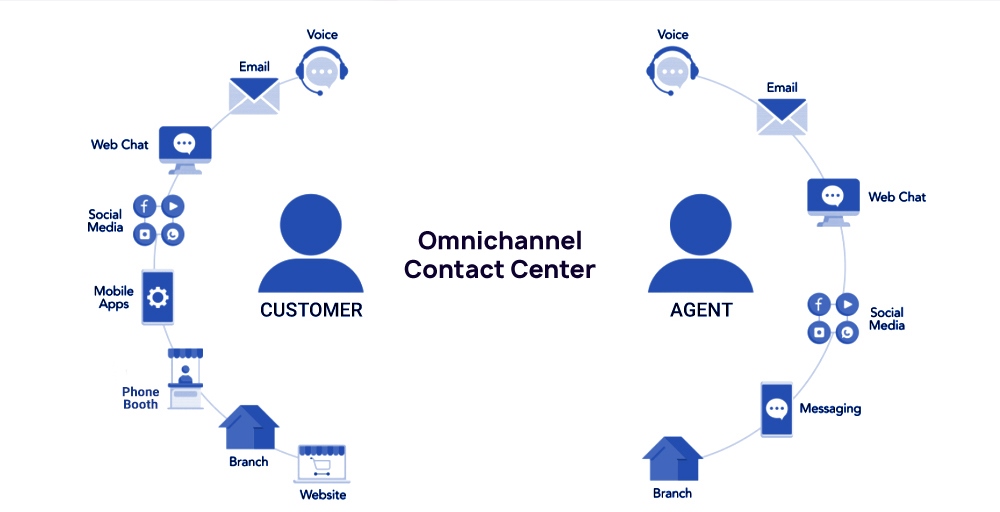
An omnichannel contact center is a customer service system that lets customers communicate with a company through multiple channels, like by phone, email, social media, or chat. This makes it easy for customers to use their favorite way to contact the company.
In an omnichannel contact center, all customer’s conversations across various channels are integrated into one place. That means customer service agents have access to every customer’s history of a person’s conversations regardless of the communication channels, which helps them to communicate effectively with customers.
For example, Starbucks customers can order and pay for drinks through their phones, monitor their transactions, and see available stores near them by just using their mobile application. This unified interface offers customers a seamless experience across different channels, enabling smooth transitions between channels without interruptions.
Benefits of Omnichannel Contact Center
Omnichannel contact centers have some benefits that overshadow multichannel systems as they integrate all the communication channels, making them easy to use for both agents and customers. Some of its benefits are:
- Enhanced Customer Experience: Omnichannel platforms boost customer resolution rates by unifying all interactions into a single log that any agent may view. This improves the customer experience and provides a seamless digital experience for customers, satisfying them and improving their loyalty.
- Quicker Responses and Resolutions: Due to agents having full access to customers’ data, such as issues, history, and preferences, they easily become familiar with the customer journey and their needs. Hence, it helps the agent provide customers with better response time and first-call resolution rates.
- Business Insights: The omnichannel system is equipped with advanced tools that give unique business insights to refine your customer service strategy. It helps you to indicate which agents perform best, which channels are preferred by clients, and the level of customer satisfaction. These data enable businesses to make more informed decisions.
- Maximized Agent Productivity: An efficient contact center aims to increase agent productivity by giving agents the most visibility and control. Omnichannel capabilities simplify workflows and assist agents in balancing requests across connected channels so they can tackle more complicated problems.
- Increased Cost Savings: Having an omnichannel system may appear to be more time-consuming and expensive than another system. But it actually comes out as being more cost-effective. This is because there is no need to set up separate channels or teams to handle individual issues. Instead, it puts everything into a single, efficient system.
Limitations of Omnichannel Contact Center
With omnichannel, you can’t only enjoy its benefits; you also have to suffer its limitations.
- Steep Learning Curve: The omnichannel system has a lot of advanced features, a dashboard, and different communication channels. Understanding and learning them can take agents and managers some time. In addition to this, analytics dashboards and omnichannel routing can also be frustrating as the process may take many attempts to customize them as you want.
- Less Specialized Agents: Some sales or customer service agents are truly masters in using only one method of communicating with customers, like by phone or online chat. However, an omnichannel system demands that agents learn how to work in many various communication channels. Agents who lack expertise in one communication channel may not be able to do the work.
- Complex Setup: Without good technical support, it is very difficult to set up and maintain an omnichannel customer service center as it has a complex setup. Also, it is to be remembered that it takes more time and money to make sure all communication channels and computer systems work together.
- Non-essential Features: Omnichannel customer service centers usually come with a ton of different features, like AI tools, scheduling tools, and lots of data reporting options. But a lot of call centers end up only using a small part of all those features. This means they aren’t getting as much value out of the whole system as they could be.
When to Use an Omnichannel Contact Center?
Some areas in which you can use an omnichannel contact center are as follows:
- Companies With Repeat Customers: Better customer experience is provided by an omnichannel contact center, especially for repeat callers. This is because the omnichannel software keeps track of the full history of every contact made by each customer and purchases. This allows the call center agents to have more information about the customer each time they talk to them.
- Website And App Optimization: Businesses that use a website or an application to engage with customers can benefit from the use of omnichannel contact centers. These systems allow you to include a button or even a chatbot in your website or app, which enables customers to reach out to you effectively. This makes it convenient for customers to reach out at the moment they need help.
- Outbound Sales And Marketing: Sales-focused call centers benefit from implementing an omnichannel customer service system. These systems seamlessly integrate with customer relationship management (CRM) tools. Thus, they give sales agents lots of customer information, like what they’ve bought before, helping to formulate similar marketing campaigns.
- Customer Service: Omnichannel contact centers help you to provide customer service through lots of different channels such as mobile calls, live chats, and emails. These systems enable the organization to meet any customer requirement and provide an organized way for agents to engage in customer service as they deal with customers across multiple platforms.
- Multi-Demographic Customer Base: Omnichannel contact centers work well for companies that have customers across various demographics, like different ages, incomes, and interests. These customers have their own preferences to contact the company through different channels. Yet an omnichannel system can be used to provide a consistent experience for all those customers, no matter how they choose to reach out.
What is a Multichannel Contact Center?
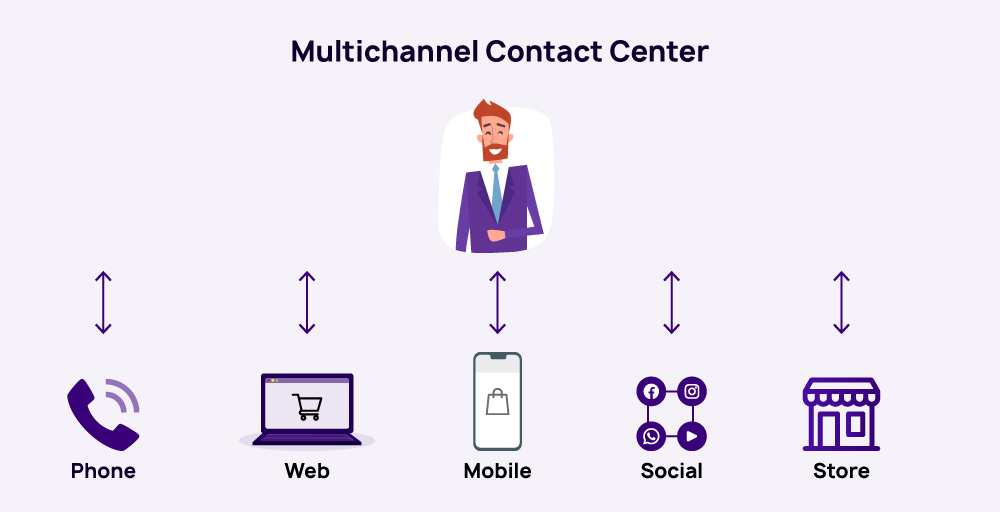
A multichannel contact center is a customer service system that helps an organization communicate with customers through various communication channels simultaneously. These channels include telephone, emails, live support, social networks, and mobile applications.
However, unlike omnichannel contact centers, it creates a new separate task each time a customer interacts. It means that the agent has to start over from the beginning each time a customer initiates a contact request. Additionally, when a customer wants to change channels during a live call, it creates a new task and increases the risk of reaching a new agent.
For example, Disney makes use of a multichannel contact center to communicate with customers over a number of channels. Each channel has separate agents’ customers can communicate with, which makes customers communicate with each agent if they use each channel.
Benefits of Multichannel Contact Center
Similar to omnichannel, you can enjoy some benefits of multichannel contact centers. Their benefits will mainly make it easy for agents to manage channels. Here are some of its benefits:
- Channel-Specific Expertise: With a multichannel content center, you can provide the best support for agents who specialize in working with customers on specific communication channels. Moreover, organizing your teams by channel makes the agents feel more responsible and motivated to give great service to the customers.
- Easier To Monitor: In a multichannel system, the number of facts and data items that managers and supervisors need to access is less than in an omnichannel system. This means that agents have only limited features and tasks viewable, hence eliminating the need to monitor a large amount of data.
- Simplicity of Operation: It is simpler and more practical to provide customer service through multichannel systems. With such systems, each agent can handle a specific communication channel. Because of this reason, it becomes easy to manage customer relations and monitor team performance closely.
- Accessibility: Multichannel systems make it possible for customers who aren’t very comfortable with technology to connect in a more traditional way, such as through emails or voice. They do not have to resort to newer technologies such as chatbots or mobile apps. This way, all the customers can get the assistance they need, no matter how tech-savvy they are.
- Lower Cost: Multichannel software that works across multiple communication channels is generally a bit cheaper than omnichannel software that provides an integrated communication experience to customers. Multichannel software usually costs within the range of $100 to $150 per user per month.
Limitations of Multichannel Contact Center
With a multichannel contact center, you also have to suffer some limitations. So, here are some limitations of the multichannel system:
- Slower Customer Service: Multichannel software often lacks advanced tools for routing calls and connecting with CRM systems. As a result, customers could end up speaking with the wrong agent when they contact the company. This often means that it will take more time to resolve the customer’s issue because the customer has to begin again with a new agent.
- Loss of Context: With a multichannel system, when a customer talks to an agent, that conversation doesn’t get saved or shared with other agents. So, every time the customer reaches out, even if it’s about the same issue, they have to explain everything all over again. As a result, the customer is unable to get their problem resolved due to loss of context.
- Customer Frustration: With a multichannel system, the agents have less information about the customer’s previous conversations. This forces a customer to repeat all their requests every time they want help from an agent. This wastes the customer’s time and can end up frustrating them.
- Siloed Agent Experience: When a company receives a customer message through various channels, the agent who speaks doesn’t have any idea of the customer’s past interactions. This makes it very challenging for the agent to assist the customer, given that they lack the right information, such as the customer’s history or recent contacts.
When to Use a Multichannel Contact Center?
Some useful areas where multichannel contact centers are used are:
- Voice-First Call Centers: Companies that only offer a telephone-based customer service, don’t really need to use an omnichannel system. Using the simpler multichannel system can help these businesses save money and effort compared to implementing a more complex omnichannel solution.
- Contact Centers with Fewer Agents: If a company only has a few customer service agents, they may not need to use an omnichannel system. This is because the customers will usually end up talking to the same agents each time they contact the company. So, a simpler multichannel setup can work just fine in this case.
- Companies Just Starting a Contact Center: If you are setting up a customer service center for the first time, it is better to use a multichannel system. Multichannel systems have a simpler interface, which makes them more user-friendly, unlike omnichannel systems which may require some level of expertise. These will therefore reduce the time consumed by an individual in training new agents.
- Organizations With a Small Budget: Those companies that don’t have a lot of money to spend on their customer service system will use a multichannel platform to save additional costs. Multichannel software tends to cost less than omnichannel software. So, if a support team is working with a tight budget, choosing a multichannel system can help them save some money.
Omnichannel Vs Multichannel Contact Center: Which Should You Choose for Your Business?
Omnichannel software might be ideal for large contact center companies that strive to integrate different customer-facing touchpoints into one customer journey. Multichannel contact centers may not provide the same level of channel unification as omnichannel software, but they can work as an alternative, especially when dealing with small contact centers or call centers.
There are a variety of benefits and uses associated with omnichannel and multichannel contact centers. A multichannel contact center might prove cheaper and allow customers to reach out through multiple channels; however, it is not as beneficial as an omnichannel contact center.
The best decision would be to invest in an omnichannel contact center because it has a single platform with interconnected channels. That is because any business growing or established is poised to grow, which is why it’s best to anticipate future growth and choose omnichannel contact centers.
The Final Thoughts: Omnichannel Vs Multichannel Contact Center
When your business goal is to deliver an exceptional and continuous experience on all channels, and you can pay for such integration and technology, the best option is an omnichannel contact center. It guarantees that customers can easily interact with you on any desired platform. This increases their satisfaction level and, hence, customer retention.
A multichannel contact center would be the right call if your company has less complex customer service needs, fewer resources, or when most customers use one primary communication channel. Instead of integrating them, you can maintain multiple channels without the headache and cost involved.

